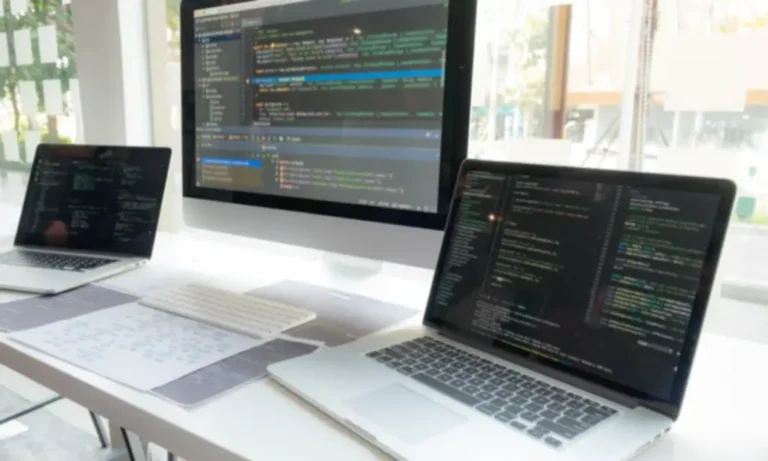Studies of Code for Better Practices

Coding is the programming foundation. Programming was developed for machines. Good coding must be human-friendly. To be self-explanatory, optimized, and readable, programmers must know coding practices.
There are several ways of problem-solving and writing code, but precise, concise, well-established, and correct formulas always lead to the right result. Good coding practice suggests methods to write easy-to-understand code. These practices give all programmers a common code writing framework.
Regardless of whether you are an experienced developer or new to IT, continue reading and find some tips for improving your coding.
Bits of Advice for Newbies
As information technologies are making their way in modern business, many people are considering starting an IT career. There are several reasons. It is trendy, offers excellent opportunities and salaries. There are several tips for those who do not know how to make better progress in education.

We are confident that we have what it takes to help you get your platform from the idea throughout design and development phases, all the way to successful deployment in a production environment!
Understanding Current Level
To evaluate and improve your programming skills, ask yourself a few questions.
- How extensive is your computer science knowledge?
Before improving what you already have, it is essential to understand your current knowledge level. Only then can you move on. Strategies for people without IT education and those who have received such education and have work experience will differ. You should go through studies of code programs for students with minimal knowledge in the first variant. In the second case, it is better to continue studies to get a degree in information technology. Understanding your level will help you find the right way to improve your knowledge and skills.
- What are your goals?
If you want to improve your knowledge and skills, work on exciting projects — you can find information on the Internet. If you need to qualitatively increase your professional level and get a promotion in your career — the best option is to get a master’s degree in IT.
So, to understand how to move on, assess your needs opportunities, and proceed.
Use Books and Other Resources
There are many books, magazines, websites, and other resources specifically for studies of code or improving coding and programming skills.
These resources can be an excellent way to get familiar with terminology phrases that need to be understood, and they can help you learn how to run some basic programs. Experienced developers can stay updated with industry norms or learn a new skill, essential for moving up the industry ladder.
The only downside of printed publications is the time it takes to write and publish them. Because computer science is a very fast-moving field, many resources may be out of date by the time they get their hands on them.
Advice for Experienced Developers
Not only do newbies need to improve code quality. Sometimes experienced developers have to refresh their coding techniques and personal qualities to improve their professional and soft skills to work in a team successfully.
Writing Readable Code
Software developers often have to share their code with other team members, end-users, or other developers who will work on the code in the future. The developer himself may have to revisit code months or years later. Therefore, it is essential to write readable code so that the developer himself or other people understand why it is written this way. This is preferable to writing “smart” but hard-to-understand code. Adopt a standard format, apply it to the codebase, and automate it. Then you can focus that energy on writing a code.
You should strive to improve code quality and make it look nice so that someone new can continue working on it and make any necessary changes.

Create Small Change Lists
You’ve probably heard about the benefits of incremental development by deploying minimal features that:
- reduces lead times;
- provides fast feedback;
- reduces technical risk.
The benefits of adding code review to incremental development become even more significant. As the change list size increases, the reviewer feedback waiting time also increases, growing superlinearly due to several factors.
- A design flaw in the big change list can affect a more significant number of implemented data segments. If you break a large change list into several smaller parts and merge them one after the other, you can avoid problems.
- The second task is to merge your change list with the main branch. While working on your CL, other people are working on theirs. Multiple change lists must be incorporated into the main unit while the code is reviewed. If different change lists share similarities with yours, the merge includes further changes that require additional review time. When a change list is left open for a long time, it annoys both the developer and the reviewer. There is no sense of progress, and it is demotivating. The work is not considered “done” and does not generate any business profit.
- It can be hard to break the change list into smaller parts. Significant API changes, transition to a new framework or infrastructure, architectural refactorings, features, etc., can arise. In most cases, the method helps to reduce lead time and helps achieve smooth and reliable progress.
Breaking the change list is very important. Bad practice to divide the change list by postponing its unit tests. This puts the codebase in an unreliable state, which may remain in the code or even get worse as you approach a deadline and new features take precedence over pending work. You should try to do small but complete work that includes tests and deployment/migration scripts.
Choosing Better Arguments
An experienced developer should be able to argue his proposals. If you have work experience, try to describe why you think it is applied to the current context. Your willingness to explain your argument empowers you to turn to textbooks, search for information on the Internet, and ask other experts and senior colleagues. You either confirm your point of view or correct your assumptions. In any case, you will gain new knowledge and experience.
Comments are a learning opportunity that helps non-experienced developers to avoid repeating mistakes in the future. This is an excellent way to gain knowledge. You can make similar comments to other colleagues when it is your turn to review. Don’t be afraid to discuss the pros and cons of the other option with your reviewer if you think it’s better. Then let the best arguments win.
In case your colleagues’ arguments are better, agree. As a developer, if you get a comment about renaming a variable but think the suggested names are similar: accept it. As a reviewer, if you want to offer a change but can’t explain the evident benefit, skip it. What seems right to you may not suit your colleagues or the project. If you think both options are acceptable, be flexible and accept someone else’s argument. Leave the desire to prove your case in vital issues.
Reviewing
A good reviewer must be a good developer. Many aspects are taken into account:
- compliance with requirements, architecture, code style and conventions, previous projects;
- the design and structure simplicity;
- readability;
- no redundant codes;
- low coupling;
- high cohesion;
- clarity and consistent names;
- safety;
- scalability;
- high availability, etc.
Many variables matter. So, review skills contain all the developing, communicating, thinking, listening, and learning skills.
Prioritize reviewing over code to reduce work in progress. Typically, a developer launches a new change list when the previous one is awaiting review. It’s an intelligent decision to simultaneously have one pending and one in development. But if the reviewer does not prioritize the reviewing tasks, his colleague will have to start the third and fourth change list. At the team level, this means a more open change list, and the team will spend more time resolving conflicts, more overhead due to context switches, and delays in making them productive and profitable and getting feedback from users.
On the other hand, review prioritization helps a team culture where everyone is judged on their performance towards a common goal.
Review prioritization is an important rule. When you have only a small amount of work left or your change list has a higher priority, the right decision is to continue with it. But in other cases, it is very beneficial to give preference to the reviewing.
Summary
Both newbies and experienced developers should remember one important thing — find projects or tasks that interest and inspire you. Such projects will challenge, entertain you and will help to keep your love of programming and avoid burnout.
Top Articles
Container vs VM (Virtual Machines): How Do They Differ?
I am here to help you!
Explore the possibility to hire a dedicated R&D team that helps your company to scale product development.






